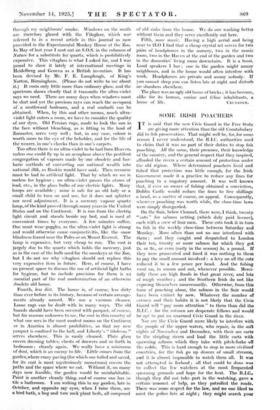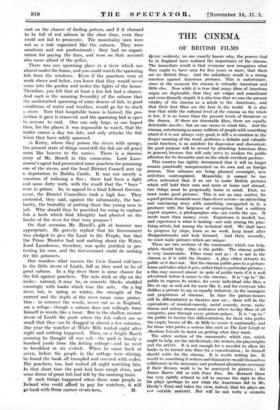SOME IRISH POACHERS
iT is said that the new Civic Guard in the Free State -1-• arc giving more attention than the old Constabulary did to fish preservation. That might well be, for, for some reason I never understood, the, R.I.C. authorities used to claim that it was no part of their duties to stop fish poaching. All the same, their presence, their knowledge of the country, and the general respect that they inspired, afforded the rivers a certain amount of protection under the old regime. Where determined poachers lived and fished that protection was little enough, for the Irish Government made it a practice to reduce any fines for poaching to a nugatory amount. It was well known that, if ever an owner of fishing obtained a conviction, Dublin Castle would reduce the fines to five shillings a -head, as a matter of course, on .appeal.. Consequently, wherever poaching was worth while, the close-time laws were simply disregarded. _On the- Suir, below Clonmel, there were, I think, twenty " cots " for salmon netting (which duly . paid licence), each, with a .crew of four men. These .cots took it in turn to: fish in the weekly close-time between Saturday and Monday. - More often than not no one interfered with them ; and they caught and despatched to London their ten, twenty or more salmon for which they got 2s. or 3s., or even (early in the season) 5s. a pound. If they were prosecuted and fined it was nothing to them to pay the small amount involved : • a levy on all the cots reduced it to a few pence per head: And the fishing went on, in season and out, whenever possible. Merci- fully there are high floods in that great river, and lots of rough weather; and the Southern Irish do not like exposing themselves unnecessarily. Otherwise, from this form of poaching alone, the sahnon-in the Suir would have been extinct by now. Whatever the number of cotmen and their habits it is not likely that the- Civic Guard will "pay more attention" to them than did the : for the cotmen are desperate fellows and would he apt to put an unarmed Civic Guard- in the river. - Nor are the Civic Guard more likely to interfere with the people of the upper waters, who repair, in the soft nights -of -November and December, with their ass carts to the stripling rivers and load the little carts -with spawning salmon which they take. with- pitch-forks -off thc-redds. This is hard enough to stop in more civilized countries, for the fish go up dozens of small streams, and it -is almost impossible to watch -them all. It was not attempted in- Ireland-; all that could be done - was to- collect -the. few watchers at the-, most frequented spawning' grounds and hope for the -best. The though . they .did not take- part in the-watching, .gave -a eettnin-,nniount of help, as they patrolled the roads. There was'Sonse -respect for -the law, and-no one liked to meet the police 'late at night; they might search your cart on. the chance. of finding poteen, and if it chanced to be full of red -salmon in the close time, even they could not fail to prosecute. The mountainy men were not as a rule organized like the cotmen. They were amateurs and not professionals ; they had no organi- zation for paying the fines, and were on that account also more afraid of the police.
There was one spawning place in a river which ran almost under the house, and you could watch the spawning fish from the windows. Even if the poachers were at .work above and below, you knew that they would never come into the garden and under the lights of the house. Therefore, you felt that at least a few fish had a chance. And such is the amazing fecundity Of the salmon that the undisturbed spawning of some dozens of fish, in good conditions Of water and weather, would go far to stock a river. Now that hospitable house is burned, the pro- tection it 'gave is removed, and the spawning bed is open to anyone to raid. One can only hope, as one hoped then, for the places it was impossible to watch, that the raider comes a day too late, and only attacks the fish when they have safely spawned.
.":n Kerry, where they poison the rivers with spurge, the present state of things must (till the fish are all gone) seem like heaven to the native. There is a famous story of Mr. Birrell in this connexion. Lord Lans- downe's agent had prosecuted some poachers for poisoning one of the rivers, and the local District Council sent up a deputation to Dublin Castle. It was not merely a Question of reducing a fine : there had been a fight and some dirty work, with the result that the " boys " were in prison. So, to appeal to a kind Liberal Govern- ment, the District Councilors took a high line. They protested, they said, against the inhumanity, the bar- barity, the brutality of putting those fine young men in jail. Why should they be punished for using to capture fish a herb which God Almighty had planted on the banks of the river for that very purpose ?
On that occasion Mr. Birrell's gift of humour was appropriate. He gravely replied that his Government was pledged to give the Land to the People, but that the Prime Minister had said nothing about the Water. Lord Lansdowne, therefore, was quite justified in pro- tecting his own, and the Government could do nothing for the prisoners.
One wonders what success the Civic Guard will have in the little rivers of Louth, full as they used to be of great salmon. In a big river, there is some chance for the fish against poachers. The nets stick or slip on the rocks : natural, it may be, or concrete blocks studded cunningly with hooks which tear the nets. On a big river, too, in spring or winter, the strength of the current and the depth of the river mean some protec- tion: in summer the weeds-, never cut as in England, are a refuge—though a salmon does not willingly bury himself in weeds, like a trout. But in the shallow, narrow rivers of Louth the pools where the fish collect are so small that they can be dragged in almost a few minutes. One year the watcher at White Mills waited night after night and nothing happened. Then, on a bright March morning he thought all was safe—the pool is barely a hundred yards from the fishing cottage—and he .went to breakfast at six o'clock. When he came_ back at seven, before the people in the cottage were stirring, he found the bank all trampled and covered with scales. The poachers, too, had waited all night watching him. In that short time the pool had been swept clean; end some dozen of great fish had left by the morning train.
-If such things happened when there were people in Ireland who could _afford to pay for watchers, it will go hard with those narrow rivers no*. M.



























































 Previous page
Previous page